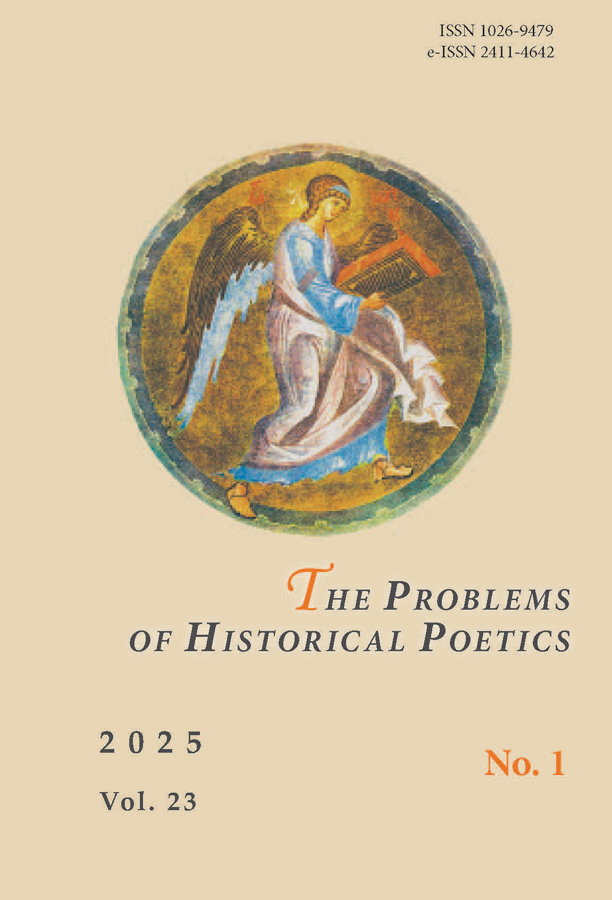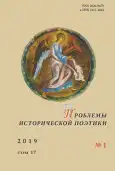The Evangelical Semantics of the Female Images of Martha and Vera in the Novel “The Precipice” by I. A. Goncharov
- Authors: Melnik V.I.1
-
Affiliations:
- Kosygin State University of Russia
- Issue: Vol 17, No 1 (2019)
- Pages: 78-93
- Section: Articles
- URL: https://bakhtiniada.ru/1026-9479/article/view/290696
- DOI: https://doi.org/10.15393/j9.art.2019.5881
- ID: 290696
Cite item
Full Text
Abstract
The article for the first time studies the gospel basis of the images of Marthenka and Vera in I. A. Goncharov’s novel “The Precipice”. Just as Pushkin highlighted an ideal image of Tatyana Larina comparing it to that one of her sister Olga, Goncharov emphasizes the personality of Vera by contrasting her with Martha. The main theme of the novel is a spiritual order of Russia that is on the brink of a “precipice” (i. e. atheism). The meaning of the name of one of the protagonists — Vera, that is Faith, — plays an important semantic role in the novel, symbolizing a possibility of the salvation of Russia, overcoming of the historical “precipices” based on faith in God. The sisters’ images point to two different paths to Holiness: the path of Martha and the path of Mary, described in the gospel. Marthenka hides under the shadow of someone else’s authority and experience, avoiding thus temptation and mistakes. Vera shows herself independent, makes a mistake, but being a strong person finally finds strength to come into repentance and spiritual “resurrection”, repeating the destiny of the grandmother and showing the signs of spiritual similarity with her. Women’s images, hidden, but deeply and consistently correlated with their Evangelical basis, are in “The Precipice” only a private manifestation of systemic changes in the poetics of the late Goncharov, more openly than before, demonstrating the connection not only with the Holy Scripture, but also with the teaching of the Holy Fathers of the Church about the so-called “spiritual warfare”. The article for the first time reveals the novelist’s attempt, without going beyond realism, to show the struggle in the human soul between the “demons” and the Holy spirit. In Goncharov’s early literary texts there are also Evangelical reminiscences. But in his last novel, the writer manifests himself not only as an expert, but also as a great interpreter of the gospel, which showed the spiritual and psychological reasons of women’s mistakes that is related to the destiny of the Evangelical Mary. The projection on the Evangelical images and the realistic representation of a spiritual battle significantly change the existing ideas about the depth of Goncharov’s spiritual search and the problems of the novel “The Precipice”.
Keywords
About the authors
Vladimir I. Melnik
Kosygin State University of Russia
Author for correspondence.
Email: melnikvi1985@mail.ru
Doctor of Philology, Corresponding Member of the Academy of Sciences of the Republic of Tatarstan
Russian Federation, MoscowReferences
- Goncharov I. A. Better Late Than Never: (Critical Notes). In: Goncharov I. A. Sobranie sochineniy: v 8 tomakh [Goncharov I. A. Collected Works: in 8 Vols]. Moscow, Gosudarstvennoe izdatel’stvo khudozhestvennoy literatury Publ., 1955, vol. 8, pp. 64—113. (In Russ.)
- Domanskiy V. A. The Gardens of the Novel “The Precipice”: Eden, Paradise Lost and Regained. In: I. A. Goncharov: (Materialy Mezhdunarodnoy nauchnoy konferentsii, posvyashchennoy 195-letiyu so dnya rozhdeniya I. A. Goncharova). Sbornik statey russkikh i zarubezhnykh avtorov [I. A. Goncharov: (Proceedings of the International Scientific Conference Devoted to the 195th Anniversary Since the Birth of I. A. Goncharov). Collection of the Articles of Russian and Foreign Authors]. Ulyanovsk, 2008, pp. 167—176. (In Russ.)
- Zakharov V. N. Orthodox Aspects of the Ethnopoetics of Russian Literature. In: Problemy istoricheskoy poetiki [The Problems of Historical Poetics]. Petrozavodsk, PetrSU Publ., 1998, issue 5, pp. 5—30. Available at: http:// poetica.pro/journal/article.php?id=2472 (accessed on December 22, 2018). doi: 10.15393/j9.art.1998.2472 (In Russ.)
- Losskiy N. O. Dostoevskiy i ego khristianskoe miroponimanie [Dostoevsky and His Christian Understanding of the World]. New York, Izdatel’stvo imeni Chekhova Publ., 1953. 406 p. (In Russ.)
- Lyubomudrov A. M. Orthodox Monasticism in the Works and Destiny of I. S. Shmelev. In: Russkaya literatura i khristianstvo [Russian Literature and Christianity]. St. Petersburg, 1994, pp. 364—394. (In Russ.)
- Mel’nik V. I. “Do Not Come Down on Your Tamara…” (The Lermontov Theme in “The Precipice” by I. A. Goncharov. In: Filologicheskie zapiski. Vestnik literaturovedeniya i yazykoznaniya [Philological Notes. Bulletin of Literary Studies and Linguistics]. Voronezh, Voronezh State University Publ., 1997, issue 9, pp. 53—67. (In Russ.)
- Mel’nik V. I. I. A. Goncharov: dukhovnye i literaturnye istoki. Monografiya [I. A. Goncharov: Spiritual and Literary Sources. Monograph]. Moscow, Moscow State University of Printing Arts Publ., 2002. 284 p. (In Russ.)
- Mel’nik V. I. Dukhovnyy put’ I. A. Goncharova [Goncharov’s Spiritual Path]. Moscow, Veche Publ., 2019. 448 p. (In Russ.)
- Nedzvetskiy V. A Psychological Course in the Literature of Critical Realism (Goncharov). In: Razvitie realizma v russkoy literature: v 3 tomakh [Development of Realism in Russian Literature: in 3 Vols]. Moscow, Nauka Publ., 1973, vol. 2, book 1. 388 p. (In Russ.)
- Starygina N. N. Demonic Signs in the Anti-Nigilistic Novel as an Expression of the Author’s Value and Worldview Position. In: Problemy istoricheskoy poetiki [The Problems of Historical Poetics]. Petrozavodsk, PetrSU Publ., 1998, issue 5, pp. 204—222. Available at: http://poetica.pro/journal/article_en.php?id=2493 (accessed on December 22, 2018). doi: 10.15393/j9.art.1998.2493 (In Russ.)
- Shcheblykin I. P. The Motif of a “Sin” and Guilt in I. A. Goncharov’s Novel “The Precipice”. In: I. A. Goncharov: (Materialy mezhdunarodnoy konferentsii, posvyashchennoy 180-letiyu so dnya rozhdeniya I. A. Goncharova) [I. A. Goncharov: (Proceedings of the International Conference Devoted to the 180th Anniversary Since the Birth of I. A. Goncharov)]. Ulyanovsk, 1994, pp. 204—212. (In Russ.)
- Fedotov G. P. About Saint Spirit in Nature and Culture. In: Fedotov G. P. Sobranie sochineniy: v 12 tomakh [Fedotov G. P. Collected Works: in 12 Vols]. Moscow, Martis Publ., 1998, vol. 2, pp. 232—244. (In Russ.)
- Theophylact of Bulgaria (Blessed). Tolkovanie blazhennogo Feofilakta arkhiepiskopa Bolgarskogo na knigi Novogo Zaveta [Interpretation of the Blessed Theophylact Archbishop of Bulgaria on the Books of the New Testament]. Moscow, Direct Media Publ., 2014. 2006 p. Available at: http://azbyka.ru (accessed on December 22, 2018). (In Russ.)
Supplementary files











